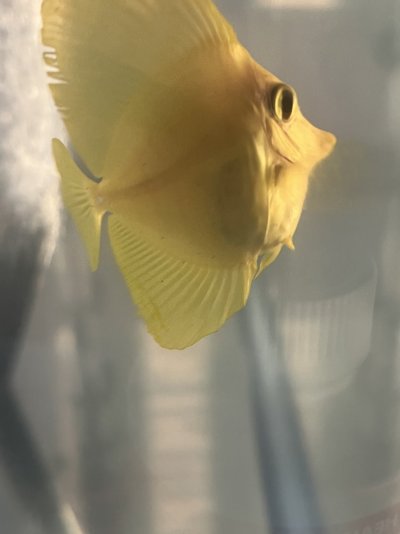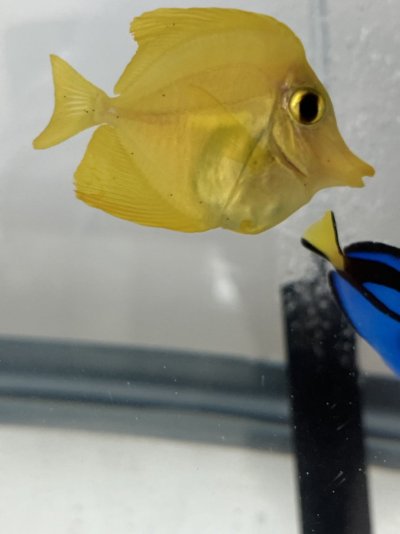Navigation
Install the app
How to install the app on iOS
Follow along with the video below to see how to install our site as a web app on your home screen.
Note: This feature may not be available in some browsers.
More options
You are using an out of date browser. It may not display this or other websites correctly.
You should upgrade or use an alternative browser.
You should upgrade or use an alternative browser.
Yellow tang with black dots
- Thread starter BRYCE_NI
- Start date
- Tagged users None
i’m having a hard time seeing them, are they raised dots, do they seem to be growing and is there noticeable swelling around the dots?
if there isit is probably black ich, although ich is actually caused by a different type of parasite. As the name suggests, the primary symptom of the infestation is tiny raised black dots on your fish's body. The black spots on the fish are tiny Turbellaria Flatworm, not as serious as ich but should be quarantined and treated immediately, treat by doing freshwater dips
if there isit is probably black ich, although ich is actually caused by a different type of parasite. As the name suggests, the primary symptom of the infestation is tiny raised black dots on your fish's body. The black spots on the fish are tiny Turbellaria Flatworm, not as serious as ich but should be quarantined and treated immediately, treat by doing freshwater dips
Last edited:
O
Welcome to Reef2Reef!
sorry - I can’t see any spots on the fish. It does have some tears in its dorsal fin, what other fish are in with it now?
Ich-X is malachite green and a low dose of formalin. It is really a freshwater medication, I wish Hikari would stop marketing it for saltwater.
Black spots on tangs are often a sign of turbellarian worm infections. Usually, you see these on wild caught tangs, not tank raised ones like this.
The two treatments for that are either high dose formalin dips or freshwater dips. It is best though, to move the fish to a clean tank after each dip (tough to do!).
Sometimes, this worm infection is self-limiting, it just goes away on its own.
Welcome to Reef2Reef!
sorry - I can’t see any spots on the fish. It does have some tears in its dorsal fin, what other fish are in with it now?
Ich-X is malachite green and a low dose of formalin. It is really a freshwater medication, I wish Hikari would stop marketing it for saltwater.
Black spots on tangs are often a sign of turbellarian worm infections. Usually, you see these on wild caught tangs, not tank raised ones like this.
The two treatments for that are either high dose formalin dips or freshwater dips. It is best though, to move the fish to a clean tank after each dip (tough to do!).
Sometimes, this worm infection is self-limiting, it just goes away on its own.
vetteguy53081
Well known Member and monster tank lover
View Badges
Partner Member 2024
Excellence Award
Reef Tank 365
RGB
Article Contributor
Tampa Bay Reef Keepers
West Palm Beach Reefer
Hospitality Award
Ocala Reef Club Member
305 Reef Club
Wisco Reefers
Midwest Reefer
Fish Medic
MAC of SW Florida
Rock Pool Reef Keepers
R2R Secret Santa 2023
My Tank Thread
My Aquarium Showcase
Expanding this pic, does look to be Black ich which is not the parasitic ich we know of but as Jay stated worms, whichare worms that give it the appearance of ich as melanin pigmentation causes the appearance of black dots . Typically, worm treatments such as PraziPro will work as will formalin based treatment for more challenging strains and even Ruby Rally Pro. If none available immediately, you can give fish a 5 minutes freshwater dip for temporary relief same temperature as display tank.
It takes one worm to start an infestation even if fish were quarantined. Best is to treat with Praziquantel better known as prazi pro for two 8 day intervals with a water change on day nine.
other option is formalin based medication such as quick cure or ruby Rally Pro starting with a bath for 45 minutes followed by treatment
Do note that Prazi will lower both oxygen and appetite, so an airstone is recommended for added aeration and monitor water quality during treatment with a reliable test kit
I don't see any noticeable swelling around these dots, I guess I will just do a freshwater dips and see how it goes, thanks!i’m having a hard time seeing them, are they raised dots, do they seem to be growing and is there noticeable swelling around the dots?
if there isit is probably black ich, although ich is actually caused by a different type of parasite. As the name suggests, the primary symptom of the infestation is tiny raised black dots on your fish's body. The black spots on the fish are tiny Turbellaria Flatworm, not as serious as ich but should be quarantined and treated immediately, treat by doing freshwater dips
Hi Jay, I just post another picture which would be clearer, currently it's quarantined with another blue tang and a scopes tang and 2 small clowns in a 20G qt, now there is no obvious ich on these fish, and I think I need to deal with these black dots, should I do freshwater dips for all of them?O
Welcome to Reef2Reef!
sorry - I can’t see any spots on the fish. It does have some tears in its dorsal fin, what other fish are in with it now?
Ich-X is malachite green and a low dose of formalin. It is really a freshwater medication, I wish Hikari would stop marketing it for saltwater.
Black spots on tangs are often a sign of turbellarian worm infections. Usually, you see these on wild caught tangs, not tank raised ones like this.
The two treatments for that are either high dose formalin dips or freshwater dips. It is best though, to move the fish to a clean tank after each dip (tough to do!).
Sometimes, this worm infection is self-limiting, it just goes away on its own.
Attachments
thanks for the clarification, I attached a clearer picture of the fish above and I will start to dose prazi tomorrow, followed by a massive water change on day 8 and see how it goes, thanks!Expanding this pic, does look to be Black ich which is not the parasitic ich we know of but as Jay stated worms, whichare worms that give it the appearance of ich as melanin pigmentation causes the appearance of black dots . Typically, worm treatments such as PraziPro will work as will formalin based treatment for more challenging strains and even Ruby Rally Pro. If none available immediately, you can give fish a 5 minutes freshwater dip for temporary relief same temperature as display tank.
It takes one worm to start an infestation even if fish were quarantined. Best is to treat with Praziquantel better known as prazi pro for two 8 day intervals with a water change on day nine.
other option is formalin based medication such as quick cure or ruby Rally Pro starting with a bath for 45 minutes followed by treatment
Do note that Prazi will lower both oxygen and appetite, so an airstone is recommended for added aeration and monitor water quality during treatment with a reliable test kit
Hi Jay, I just post another picture which would be clearer, currently it's quarantined with another blue tang and a scopes tang and 2 small clowns in a 20G qt, now there is no obvious ich on these fish, and I think I need to deal with these black dots, should I do freshwater dips for all of them?
This looks like a minor turbellarian infection. Most likely, it was in contact with a wild caught tang and got it from them. Depending on timing, etc., it could have been the scopas, as spots on scopas are difficult to see clearly and it could have had them.
FW or formalin dips are the best way to control these, however dips can be stressful and even fatal if done incorrectly.
As I said, minor infections often go away by themselves, that's why praziquantel *seems* to work in some cases - you dose it and a week or so later, the spots go away and you think it worked, but actually, it was just timing.
Thanks, Jay, for the heads up, I actually didn't do anything yesterday, and when these dots are gone this morning by themselves, hopefully it's not gonna come back, again, big thanks!This looks like a minor turbellarian infection. Most likely, it was in contact with a wild caught tang and got it from them. Depending on timing, etc., it could have been the scopas, as spots on scopas are difficult to see clearly and it could have had them.
FW or formalin dips are the best way to control these, however dips can be stressful and even fatal if done incorrectly.
As I said, minor infections often go away by themselves, that's why praziquantel *seems* to work in some cases - you dose it and a week or so later, the spots go away and you think it worked, but actually, it was just timing.
Similar threads
- Replies
- 4
- Views
- 240
- Replies
- 6
- Views
- 260
- Replies
- 10
- Views
- 214
- Replies
- 7
- Views
- 158
- Replies
- 11
- Views
- 177



















